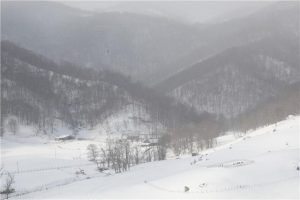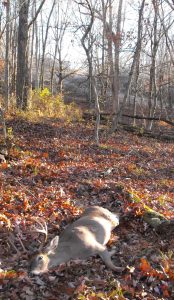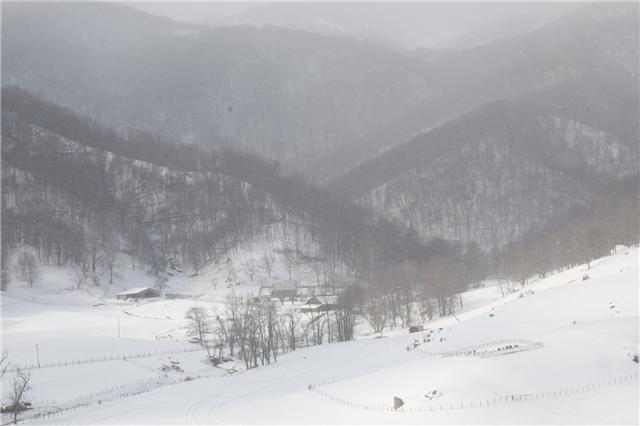MEAT
© 2019 Walt Hampton
*This is a long one, but important to me. Several years ago a family member ask me to provide some advice for his daughter, who was graduating high school and headed off to college. This young lady is intelligent and beautiful–but being a ‘middle child’ has presented some issues, to which I’m sure we all can relate. I love this young woman, but giving advice about adventures or life is very dangerous; so I tried to preface my council with some real personal experience, and perhaps hoped she could relate to it.
MEAT
It was dark by the time I had the last of the gear unloaded and in the cabin. With the little flashlight I found the lantern, pumped it up and got it lit, then hung the bail over the bent nail in the rafter, the nail I had watched Alan drive in 40 years ago. I remember him using the claw and giving the head of the nail a little kink so the bail would be secure.
I loaded the Fisher and got it huffing then turned to the pile of equipment. It only took a few minutes to get the food stacked on the dry sink and table and the sleeping bag and pillow on the padded bench-bed, and the gun case secure there too. I had left the cooler on the porch and from it I retrieved a can drink.
I sat back into the cloth lounge chair by the stove and loosened the laces in my boots, fished a cigar from my sweater pocket and touched it off with one of the kitchen matches, struck on the corner of the stove; over the huffing of the stove I could still hear the roaring of the wind outside, high up on the Mountain in the big timber, punctuated by the irregular rattle of the loose corner of tin on the porch roof. The warmth of the stove was spreading across the room now, pushing back the cold stale air and in reflex I took off my sweater, hanging my shoulder rig and the .357 on the back of the chair, and reached for the backpack and the whiskey flask. I sat for a while with the pack and flask in my lap and just listened to the cabin, without moving, except for sweeping my eyes around the room into the shadows. The wood walls creaked as they warmed up; the lantern hissed, the stove huffed, and the tin rattled.
I poured a shot of whiskey but set it aside, instead pulling the cast-iron pan from the cook box and put it on the stove. Out on the porch to the cooler, I retrieved a Ziploc with 6 pieces of bacon and dumped it into the already-hot pan, the sizzle sound it made somehow very comforting. Then I drank the 2-ounce shot I had poured and relit the cigar and missed my boys, not in a sad way but in anticipation of the morning to come.
————-
When I stepped off the porch that morning in the dark I looked up at the moon, waxing gibbous with a crystal ring around it, with a thin layer of overcast just letting it shine through. It was calmer now but the cold black air felt heavy and pregnant and I knew it meant snow. I shifted the pack around on the straps over my shoulders, slung the rifle, and started without the flashlight up the steep climb behind the cabin through the timber.
The patches of old snow in the woods made the walk easier, easier to see the down limbs and brush I avoided, and it took about 45 minutes with my stop-and-go walking to work my way up across the long field at the top of the ridge and up to the break of the next ridge, and to the maple tree with the rock at its base. I was early and I knew it but that was alright; better early than late. I got arranged and comfortable with the rifle resting on the shooting sticks, a round bolted in and the safety set, and pulled the .357 and laid it on my pack at my side. I wanted two deer if I could get them and had the tags to take a third. Two would be fine but three would be better. And in the milky darkness I waited.
With this much moon, shooting light is a surprise; one second you cannot see the power markings on the scope, the next you can, and shouldering the rifle, through the scope you can see the crosshair and make out the ground beyond you. I had put the rifle back on the sticks and sat back against the maple when I heard the leaves crunching quickly-closer back to my left, out of sight over the sharp crest of the ridge. I didn’t have time to take up the rifle; I plucked the .357 from the pack and just as I raised it, cocking the hammer as I did, the big doe trotted up and out from behind a tree at 20 yards, her head snapping around toward me and just as quick I shot her just below the corner of her jaw in the center of her throat. She went down hard and I stood quickly with the re-cocked revolver centered on her chest but the way she hit the ground you knew she would not get up. I stood still and listened, trying to hear above the ringing in my ears from the shot, and the woods were still.
She had been alone; probably in heat and had run her last-year’s fawns off, maybe I hoped being dogged by a rutting buck. I sat back down quickly and quietly and laying the revolver back on the pack, took the rifle in my hands. Within a minute off to the right and down the ridge I could hear more shuffling in the leaves, not the panic sound of a deer running but the deliberate shuffling gate of a deer coming around the ridge below me.
When he came into sight at 70 yards he had his head down and his nose within inches of the ground, his pace a quick running-walk, his neck swollen and the hair on his withers erect and black-looking, like a mane. He had three up on the left beam and that was enough for me and I swung with him, the crosshair on the center of his left shoulder, as he angled up the side-hill toward where the doe was lying, now slightly quartering-to instead of broadside and closing fast. The rifle shoved against my shoulder and he launched forward like a racehorse out of the gate, but on his second stride he centered a 30-inch locust with his chest and the impact set him back on his ass, then he just sagged over and collapsed. I don’t remember throwing the case and reloading but I had; and through the scope I saw one blood-and-steam geyser blow out above him from the exit wound and that was that. I do not remember the sound of the shot. I watched his body through the scope for 5 minutes. From where I sat I could see one side of his rack sticking up.
Even with taking my time and stopping occasionally to listen, both deer were gutted and propped open, side by side, in under half-an-hour. I had pulled the doe down the hill to where the buck fell to do the necessaries and here beside and just above them, now I sat on the little short-legged stool, rolling my sleeves back down and putting on my coat to beat back the chill. As I was lighting a cigar the first snowflake landed on the back of my hand.
It took almost an hour to pull the deer down the hill to the old roadbed, pull one a ways, go back and pull the other down to it, repeat, and in that time the snow fell steadily, first fine flakes mixed with a bit of sleet then big flakes, sticking to the limbs and my boots as the ground disappeared under them. I had to sling the gun European style, muzzle down, on my right shoulder, my right hand holding the strap, to be sure of keeping it out of the barrel.
The wind, what there was of it, was northwest and I stood at the old roadbed with the deer at my feet, trying to decide if I wanted to go for the truck or keep hunting. I was pondering this question when I glanced west out the road and caught the ghostly shadows of deer in the falling snow crossing the road just where it turned north and out of sight.
I dropped the pack with the deer and checked the rifle, chambering a round, and started walking deliberately across through the timber to try to cut them off, to get a bit above and in front of them. I knew where they were going. In 5 minutes I eased up to the edge of the timber at the north end of the little field, rifle at ready, the brim of my hat low across my forehead to keep the snow off my glasses and stopped, shielded from the field beside and behind a big hickory, to glass the briar-patches.
Below me at about 80 yards I barely saw a deer’s rear ease into a blackberry thicket. Shielding the rifle scope under my left armpit, leaned up against the tree to steady myself, I pulled the Zeiss glasses from my coat and slowly, carefully, dissected each briar patch, the falling snow complicating the effort, until I saw what I was looking for, that tell-tale horizontal line in a maze of vertical shapes, the line of a deers back. This one had to be a doe; my one-per-day buck already reposed with my backpack and his girlfriend back beside the roadbed.
There were 7 deer in the field, shifting between patches of cover; two were spikes for sure and one a small 6-point, and the two on the far left were certainly fawns, Coke-bottle heads and tiny necks; the other two, to the right of the gang and somewhat apart, betrayed their sex and maturity by their body language, spending more time watching and listening with ears forward and noses raised, and mostly hidden by cover. I focused my attention on them.
I pushed the binoculars back inside my coat and without taking my eyes off the target deer raised the rifle, slowly, deliberately. At this location the shot had to put the deer down immediately; from where she stood it was only three leaps to the steep ridge-side and from there one stride down into the heartbreakingly steep, impossible bluffs and rhododendron. If I had a deer down, down there, I’d have to eat it to get it out. No, this one had to drop to the shot. My choices were head, neck or a precise high-center shoulder hit. No lung shots here, no buddy.
I had an awesome steady rest on the hickory and I waited. The snow fell. The other deer milled and browsed. The doe I was watching stayed screened, or put her damn head down when she came to an opening in the stickers. Twenty minutes passed. The 6-point bedded down, then the spikes likewise near him, and the fawns slipped away over the brow of the hill and out of sight. The clock was ticking.
This is that point in a hunt where things can go either way. I was in a good position, I had the wind, the right tool for the job in my hands and I was focused. The deer had the weather and the cover; if the snow got heavier I wouldn’t be able to see precisely enough for the shot I needed; and all she had to do from where she now stood was turn 90 degrees right, take three steps and she would live. My only real advantage was knowing that I must let the deer make the mistake. It was enough.
She stepped into a cattle path between two blackberry patches and turned her head mostly away from me, looking down into the timber beyond her. Without hesitation and with a rock-steady hold I shot for the base of her left ear. The bullet was through her head and half-way to Comers Rock before the sound of the shot reached her. She collapsed in her tracks.
———————————————————————–
I could tell you about the rest of it, the long walk in the snow back to the cabin for the truck, back with the truck to pick up the deer, then back to the cabin again. Hanging the deer, the skinning, the butchering, the quarters finally hanging up under the porch roof in cheesecloth bags; and finally standing, steaming-skin naked, by the rekindled wood stove in the cabin, surrounded by the snow-wet and dripping hunting clothes, themselves steaming on the inside clothesline. Then warm and fed with fresh broiled tenderloin, sitting at the table by the lantern light, sharpening the knife and cleaning the rifle, sipping warm whiskey, a cigar between my knuckles. Then the heavy sleeping bag pressing me down into the foam mattress, the cool pillowcase against my face, while the stove huffs and the tin rattles.
Tomorrow is another day.
____________________
Dear_____;
When I thought about you I sat down and wrote this. I know that seems strange because we don’t know each other and you really couldn’t care less about certain things but hear me out–and pay some attention because maybe no one has told you these things before.
The hardest struggle in human life is to come to terms with ourselves. Think about it; when you are alone are you thinking about how others perceive you, or are you free to concentrate on things that matter? We can only be free, truly free inside, if we are content with who we really are. You are the only one you cannot hide from, at least for long and everything you do and say will be right there waiting to answer you when you ask “Why?” The world is terrifying for us all–yes wonderful at times and all that but we all of us humans fear what we may become and every day we have to decide for ourselves how we are going to take what comes, and who we will be when we are called to stand forth. You’re sailing along, not a care in the world, everything according to plan then right in the center of the channel you go aground, stuck fast and taking water. Someone has to take the haul rope to the shore or it will be curtains for those innocent and no one is stepping forward. And yes, you are scared but you drop your shoes anyway and slip over the side and when you’re half-way out the shoal and the current hits you, you mess yourself but you don’t stop. You keep going. And just when you don’t think you can take another step there is a hand reaching from the bank—and this is the point—whose hand is reaching out to you is your decision to make. If you make the right decision it will be you that you see reaching out from that bank and says “I’ve got you.”
I know you’ve been told about God all your life and there is nothing easier than dismissing the concept. But there is one thing of which I am certain: if you want to talk to God it has to be you that starts the conversation. No guile, no theatrics, save the water works; look Him right in the eye and give it over to Him, the straight skinny from the bottom of your soul. And He will answer you, the same way He answered me.
So, are you going to be the hunter, or the meat? Live your life with the pedal on the floor. Hold back nothing, not your fear or your love or your insatiable passion, and live it so that when the time comes you can be comfortable alone, knowing you have left it all there on the field; then you will be the woman I know that is in there, and a complete person.
Love
Uncle Walt
3-6-16



